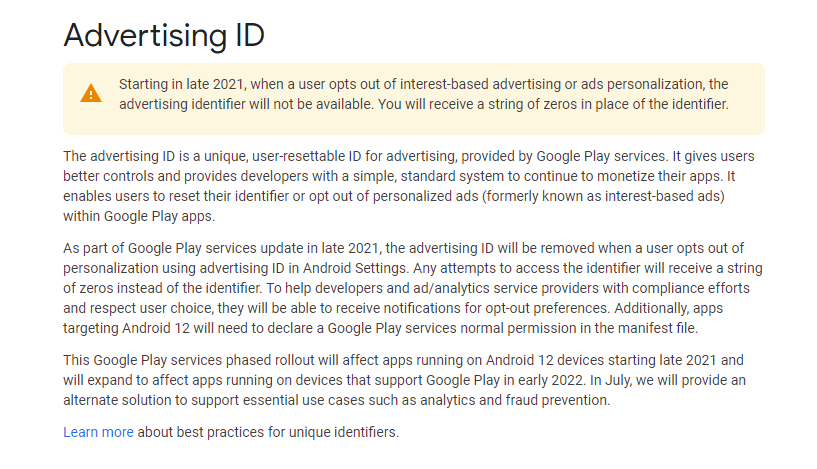First Apple, then Google: Android users to get ad ID opt-out

"Starting in late 2021, when a user opts out of interest-based advertising or ads personalization, the advertising identifier will not be available," Google said in a post.
After Apple took a bite out of mobile ad tracking, Google now says it will allow mobile users to opt out of personalised ads in Android apps and block unique device IDs starting later this year. Some think Google is positioning for an Apple-style approach across its app ecosystem, which would further wedge Facebook.
Google says it will allow mobile users to opt out of personalised ads in Android apps and block the unique device ID in its upcoming update, Android 12.
In a Google Play blog post aimed at developers, updated on Wednesday, Google says any attempt to access the identifier from opted-out users will “receive a string of zeros”.
“Starting in late 2021, when a user opts out of interest-based advertising or ads personalisation, the advertising identifier will not be available. You will receive a string of zeros in place of the identifier,” the post said.
“This Google Play services phased rollout will affect apps running on Android 12 devices starting late 2021 and will expand to affect apps running on devices that support Google Play in early 2022. In July, we will provide an alternate solution to support essential use cases such as analytics and fraud prevention.”


Jackie Singh, a cybersecurity consultant who worked on Joe Biden's presidential campaign, told the Financial Times the move is a "seismic shift" for the digital advertising industry.
“It is likely that Google perceives these changes to be in their best interest, not only for the purpose of managing public perception around privacy and competing with Apple, but to increase their control over user devices and data,” she said.
Chris Brinkworth, a first party data measurement expert, said: “Google have been following suit when it comes to privacy and tracking approaches that Apple take within their client-side ecosystem.
“This could potentially be Google getting into a position where they could introduce an App Tracking Transparency (ATT) style notification on Android apps, similar to that of Apple.”
Experts have been warning marketers to gear up and get ready for privacy and cookie changes for months. Google has reportedly been exploring alternatives to Apple’s anti-tracking features for some time, trying to balance increasing demands for privacy with the financial needs of advertisers and developers.
This update comes in the wake of two court cases, one local and one global. First, the Australian Competition and Consumer Commission won its case against Google that it misled consumers about the collection and use of location data. Second, unredacted documents from a lawsuit by Arizona against Google show the company’s executives and engineers were aware that the search giant had made it hard for smartphone users to keep location information private.

